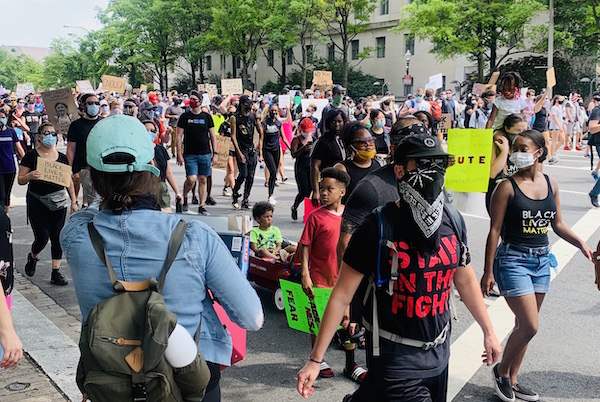Jan 13, 2026 2:09 PM
More Trump-Kennedy Center Cancellations
The fallout from the renaming of the John F. Kennedy Center for the Performing Arts to include President Donald…

Protesters march June 6 in Washington, D.C., following the police killing of George Floyd.
(Photo: John Murph)Myers grasps the need for safety precautions, too, but warned against complacency: “Far too often, jazz musicians just wait to put their music out or hit the bandstand when making political statements. In this moment, it’s not time for that. In this moment, you must make your statements very clearly to your fans.”
For sure, the outcry over Floyd’s killing—as well as the recent slayings of Breonna Taylor and Ahmaud Arbery—has reached beyond expectations. Recent protests noticeably have been multicultural and multiracial, and spread across the globe. With those protests came various statements from non-Black individuals, corporations, small businesses and nonprofit organizations, voicing solidarity with the Black Lives Matter movement.
Some, though, perceive these newfound declarations of solidarity—particularly on social media—as nothing more than “thoughts and prayers” with insubstantial follow-through.
On June 2, Brianna Agyemang and Jamila Thomas, two music executives, launched Blackout Tuesday, a social-media call to action for the industry to halt the release of new music and to cease business operations for a day as a show of protest against the killings of countless Black Americans. Blackout Tuesday also brought attention to economic injustices the industry at large has inflicted on Black performers throughout the history of recorded music. But amid the swirl and sensationalism of today’s 24-hour news cycles, some musicians perceived its mission to be unclear.
“I had no idea what it was about,” Stewart recalled. “I heard about it [the day before it happened]. It hearkened back to my distinction between the art industry and the entertainment industry. That seemed like an entertainment-industry issue. I’m not knocking that industry; it’s just not immediate in my sphere.”
Stewart went on to detail decades of economic disparities that fall along racial lines and affect the number of Black people who gain access to the jazz industry through higher education. He also mentioned that fewer young Black jazz musicians in comparison to their white counterparts can weather the high costs of living in metropolitan cities like New York, and said that he’s had to compete with white jazz musicians who have had greater access to formal education and elders of the genre.
“There are a lot of young white musicians with a certain attitude of almost showing off their prowess in ‘Blackness’ at the expense of other Black jazz musicians,” said Stewart, as he recalled a specific instance at the New York club Smalls in 2010. Across from the club, he saw graffiti that said “White Negro,” a reference to Norman Mailer’s essay The White Negro: Superficial Reflections on the Hipster, which discussed the “psychic havoc” of mid-20th century living. When Stewart entered the club, he noticed an audience of aspiring young musicians, sprinkled with established performers, like vocalist Andy Bey. Based on the demographics of that crowd, it was clear to the bassist that there was an oddly balanced racial dynamic at work, not just in the club, but more broadly in the industry.
“It’s ... an attitude that [says], ‘I have conquered your Blackness; I’ve conquered your culture,’” he said.
Following Blackout Tuesday, the music industry witnessed some movement aimed at fighting racial injustice. The online music marketplace Bandcamp announced that it would donate its portion of sales from Juneteenth, which commemorates the end of slavery each year on June 19, to the NAACP. The Warner Music Group and a charitable foundation affiliated with its parent company announced a $100-million fund to help “groups promoting social justice, specifically against violence and racism,” according to the Los Angeles Times.

Belá Fleck during an interview with Fredrika Whitfield on CNN.
Jan 13, 2026 2:09 PM
The fallout from the renaming of the John F. Kennedy Center for the Performing Arts to include President Donald…

Peplowski first came to prominence in legacy swing bands, including the final iteration of the Benny Goodman Orchestra, before beginning a solo career in the late 1980s.
Feb 3, 2026 12:10 AM
Ken Peplowski, a clarinetist and tenor saxophonist who straddled the worlds of traditional and modern jazz, died Feb. 2…

The success of Oregon’s first album, 1971’s Music Of Another Present Era, allowed Towner to establish a solo career.
Jan 19, 2026 5:02 PM
Ralph Towner, a guitarist and composer who blended multiple genres, including jazz — and throughout them all remained…

Rico’s Anti-Microbial Instrument Swab
Jan 19, 2026 2:48 PM
With this year’s NAMM Show right around the corner, we can look forward to plenty of new and innovative instruments…

Richie Beirach was particularly renowned for his approach to chromatic harmony, which he used to improvise reharmonizations of originals and standards.
Jan 27, 2026 11:19 AM
Richie Beirach, a pianist and composer who channeled a knowledge of modern classical music into his jazz practice,…